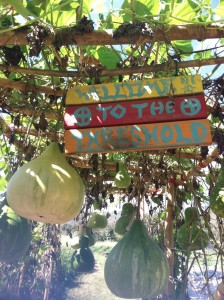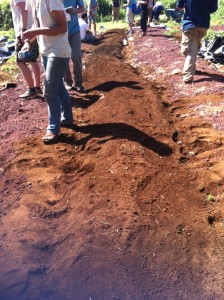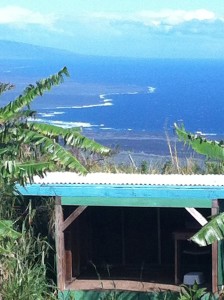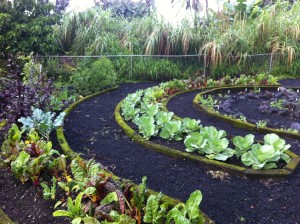By Dr. Jessica Romeyn
Last week I had the opportunity to visit Pacific Quest in lovely Hawaii. Located on the Big Island in Hilo, Pacific Quest (PQ) is not your average wilderness program. Created by Mike and Suzanne McKinney, PQ has 2 programs; one for adolescents and the other, young adults. The model for the programs is “Sustainable Growth“, a focus on the mind, body, and emotions.
 The moment I stepped foot onto the adolescent campus I felt an overwhelming sense of peace and stillness. I traveled with several other consultants and we were welcomed by the students in a ritual like passing. As I stated out loud my desired intent in life, I was welcomed through the passage by a young man who was graduating in a couple of days. As a group, we then were introduced to the beloved “Land Man”, Travis Slagle, Horticultural Therapist. He walked us through the process by which the adolescents and young adults explore their emotions, learn emotional regulation, and grow as a result of planting and harvesting produce. Once we had a general understanding of Horticultural Therapy we were put to work. Along side the adolescents, we shoveled, sifted, and planted beans. The activity gave us an opportunity to connect with the adolescents and gain a better understanding of
The moment I stepped foot onto the adolescent campus I felt an overwhelming sense of peace and stillness. I traveled with several other consultants and we were welcomed by the students in a ritual like passing. As I stated out loud my desired intent in life, I was welcomed through the passage by a young man who was graduating in a couple of days. As a group, we then were introduced to the beloved “Land Man”, Travis Slagle, Horticultural Therapist. He walked us through the process by which the adolescents and young adults explore their emotions, learn emotional regulation, and grow as a result of planting and harvesting produce. Once we had a general understanding of Horticultural Therapy we were put to work. Along side the adolescents, we shoveled, sifted, and planted beans. The activity gave us an opportunity to connect with the adolescents and gain a better understanding of  the therapeutic process. Last Thanksgiving PQ donated close to 80 lbs of beans to the local community to be served at thanksgiving dinner. Additionally, they take the weeks harvest and sell at the local farmers market and donate the proceeds to a chosen island organization. It was a wonderful experience that left my arms a bit sore the next day.
the therapeutic process. Last Thanksgiving PQ donated close to 80 lbs of beans to the local community to be served at thanksgiving dinner. Additionally, they take the weeks harvest and sell at the local farmers market and donate the proceeds to a chosen island organization. It was a wonderful experience that left my arms a bit sore the next day.
We were then treated to lunch made by the kids; fresh avocado and veggie soup, green salad with homemade dressing, fresh fruit, guacamole, and pineapple tea. The food was fantastic! Most of the meals served at PQ come from the garden with protein additions. The adolescents joined us for the meal. Throughout the meal we discussed the phase system, rites of passage concepts, and the overall sense of the program. All of the adolescents commented on their love for the treatment team, the food, and the atmosphere. This was the first placement for some of the adolescents and they appreciated the opportunity to attend PQ. For most of the day (6a-6p) the participants; adolescents and young adults, spend time in their prospective areas, harvesting, participating in therapeutic sessions and groups, cooking meals, learning life skills, and reflecting in their “Hales”. “Hale” pronounced  HA-LAY is Hawaiian for simple thatched roof dwelling. Every participant is assigned a Hale and has the opportunity to utilize it for shelter throughout the day. At the end of the day, all of the participants retire to the dormitory area. The dorms are very simple, clean, and have working showers and bathrooms.
HA-LAY is Hawaiian for simple thatched roof dwelling. Every participant is assigned a Hale and has the opportunity to utilize it for shelter throughout the day. At the end of the day, all of the participants retire to the dormitory area. The dorms are very simple, clean, and have working showers and bathrooms.
The young adult program is located in Reeds Bay, in the town of Hilo and is right on the water. Water activities include but are not limited to canoeing, stand up paddle boarding, swimming, and fishing. All participants, adolescents and young adults, have opportunities for outings including hiking the volcanoes, fishing, swimming, and community service. They also have opportunities to participate in Yoga, Strength Training, and Qi Gong.
The clinical team, spearheaded by Hilary Moses, is an impressive one. The focus on Rights of Passage, Mindfulness, and Horticultural Therapy provides a well rounded treatment approach. Additionally, they have Dr. Britta Zimmer, Naturopathic Physician. She works with the psychiatrist, participant, family, and PQ team members to provide a well rounded nutritional program and integrated medical treatments as necessary including the use of supplements. All of the participants I spoke to love Dr. Britta and commented on how since they arrived at PQ their sleeping, eating, and overall health have vastly improved. One participant had lost close to 30 lbs just by living a more mindful and healthier lifestyle.
overall health have vastly improved. One participant had lost close to 30 lbs just by living a more mindful and healthier lifestyle.
The pure and true healing power of nature is incredible! You can feel the sense of pride and accomplishment from all of the participants. It was a pleasure visiting the program and I look forward to referring families.
Some References:
Gardening for Children with Autism Spectrum Disorders and Special Educational Needs: Engaging with Nature to Combat Anxiety, Promote Sensory Integration and Build Social Skills. Natasha Etherington (2012).
Green Nature/Human Nature. Charles Lewis (1996)
Sustainable Growth At Pacific Quest
By Dr. Jessica Romeyn Last week I had the opportunity to visit Pacific Quest in lovely Hawaii. Located on the Big Island in Hilo, Pacific Quest (PQ) is not your average wilderness program. Created by Mike and Suzanne McKinney, PQ has 2 programs; one for adolescents and the other, young adults. The model for the programs …
By Dr. Jessica Romeyn
Last week I had the opportunity to visit Pacific Quest in lovely Hawaii. Located on the Big Island in Hilo, Pacific Quest (PQ) is not your average wilderness program. Created by Mike and Suzanne McKinney, PQ has 2 programs; one for adolescents and the other, young adults. The model for the programs is “Sustainable Growth“, a focus on the mind, body, and emotions.
We were then treated to lunch made by the kids; fresh avocado and veggie soup, green salad with homemade dressing, fresh fruit, guacamole, and pineapple tea. The food was fantastic! Most of the meals served at PQ come from the garden with protein additions. The adolescents joined us for the meal. Throughout the meal we discussed the phase system, rites of passage concepts, and the overall sense of the program. All of the adolescents commented on their love for the treatment team, the food, and the atmosphere. This was the first placement for some of the adolescents and they appreciated the opportunity to attend PQ. For most of the day (6a-6p) the participants; adolescents and young adults, spend time in their prospective areas, harvesting, participating in therapeutic sessions and groups, cooking meals, learning life skills, and reflecting in their “Hales”. “Hale” pronounced HA-LAY is Hawaiian for simple thatched roof dwelling. Every participant is assigned a Hale and has the opportunity to utilize it for shelter throughout the day. At the end of the day, all of the participants retire to the dormitory area. The dorms are very simple, clean, and have working showers and bathrooms.
HA-LAY is Hawaiian for simple thatched roof dwelling. Every participant is assigned a Hale and has the opportunity to utilize it for shelter throughout the day. At the end of the day, all of the participants retire to the dormitory area. The dorms are very simple, clean, and have working showers and bathrooms.
The young adult program is located in Reeds Bay, in the town of Hilo and is right on the water. Water activities include but are not limited to canoeing, stand up paddle boarding, swimming, and fishing. All participants, adolescents and young adults, have opportunities for outings including hiking the volcanoes, fishing, swimming, and community service. They also have opportunities to participate in Yoga, Strength Training, and Qi Gong.
The clinical team, spearheaded by Hilary Moses, is an impressive one. The focus on Rights of Passage, Mindfulness, and Horticultural Therapy provides a well rounded treatment approach. Additionally, they have Dr. Britta Zimmer, Naturopathic Physician. She works with the psychiatrist, participant, family, and PQ team members to provide a well rounded nutritional program and integrated medical treatments as necessary including the use of supplements. All of the participants I spoke to love Dr. Britta and commented on how since they arrived at PQ their sleeping, eating, and overall health have vastly improved. One participant had lost close to 30 lbs just by living a more mindful and healthier lifestyle.
overall health have vastly improved. One participant had lost close to 30 lbs just by living a more mindful and healthier lifestyle.
The pure and true healing power of nature is incredible! You can feel the sense of pride and accomplishment from all of the participants. It was a pleasure visiting the program and I look forward to referring families.
Some References:
Gardening for Children with Autism Spectrum Disorders and Special Educational Needs: Engaging with Nature to Combat Anxiety, Promote Sensory Integration and Build Social Skills. Natasha Etherington (2012).
Green Nature/Human Nature. Charles Lewis (1996)